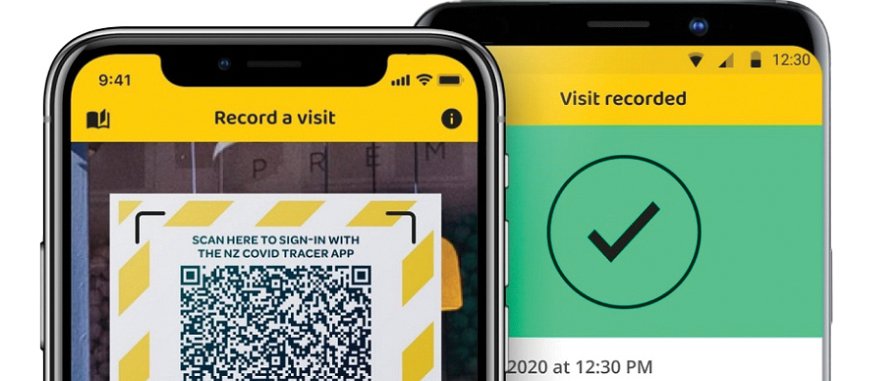Respiratory physician Lutz Beckert considers chronic obstructive pulmonary disease management, including the prevention of COPD, the importance of smoking cessation and pulmonary rehabilitation, and the lifesaving potential of addressing treatable traits. He also discusses the logic of inhaler therapy, moving from single therapy to dual and triple therapy when indicated, as well as other aspects of management
QR code scanning complacency worse than ever pre-Delta – Otago Audit
QR code scanning complacency worse than ever pre-Delta – Otago Audit

A group of Otago researchers is welcoming mandatory scanning of QR codes after results from a new audit showed Dunedin residents were scanning into business premises only 9 per cent of the time just before the current lockdown.
The audit, undertaken by final year medical students and overseen by the University’s Centre for International Health Co-director Professor Philip Hill, analysed data from 4200 visits at 64 different locations around Dunedin, including cafes, bars, restaurants, supermarkets, retail stores, gyms, pools and churches.
Overall, between July 18 and August 1, the Dunedin community was scanning into business premises only 9 per cent of the time, but that rate dropped to 2 per cent for bars and 3 per cent for restaurants.
Researchers spent 45 minutes at each location, recording information about rates of scanning, QR code poster displays and how well businesses followed the guidelines for how to display their QR code. The study found that supermarkets and cafes had the best scanning rates at 10-13 per cent and bars, gyms and pools had the lowest rates of scanning at 2-5 per cent. It was also noted that only 0.2 per cent of people entering supermarkets used paper sign in instead of the QR code.
A similar audit conducted in February reported an overall median proportion of 10 per cent scanning.
Professor Hill says this audit confirmed the suspicion of significant complacency in New Zealand leading up to the Delta outbreak.
“We need to all make QR scanning part of normal life during the pandemic, no matter what the current case numbers in any part of the country are. Along with making sure we get tested as soon as we get any cold or flu-like symptoms, these will give us a great chance of stamping out future outbreaks without requiring prolonged lockdowns.”
Final year medical student Eric Munro, who was involved in the latest audit, says voluntary scanning clearly does not work for New Zealanders.
“How can we genuinely expect the QR code to provide benefit to our COVID-19 contact tracing efforts if less than 10 per cent are using it? We can’t.”
He believes New Zealand can be confident in the success of compulsory QR code scanning after the experience of mandatory mask-wearing.
“New Zealanders responded well to the making of mask wearing mandatory. Beforehand, almost no one was wearing a mask on a plane. Since, everyone wears a mask – there has been no significant backlash or difficulty with implementation. There is no reason to believe that the situation would be different for mandatory QR code scanning.”
Results
Table. Mean Percentage of QR scanning for visits by venue categories
|
Venue category (July dataset) |
Number |
Weighted mean |
Weighted SD |
|
Bars |
574 |
2% |
3% |
|
Cafes |
357 |
10% |
11% |
|
Churches |
247 |
7% |
4% |
|
Gyms & Pools |
225 |
5% |
3% |
|
Restaurants |
135 |
3% |
5% |
|
Retail |
634 |
8% |
9% |
|
Supermarket (Large) |
1821 |
14% |
14% |
|
Supermarket (Large) (paper sign-in) * |
- |
0.2% |
0.7% |
|
Supermarket (small) |
204 |
6% |
9% |
|
Grand Total |
4197 |
9% |
11% |




![Barbara Fountain, editor of New Zealand Doctor Rata Aotearoa, and Paul Hutchison, GP and senior medical clinician at Tāmaki Health [Image: Simon Maude]](/sites/default/files/styles/thumbnail_cropped_100/public/2025-03/Barbara%20Fountain%2C%20editor%20of%20New%20Zealand%20Doctor%20Rata%20Aotearoa%2C%20and%20Paul%20Hutchison%2C%20GP%20and%20senior%20medical%20clinician%20at%20T%C4%81maki%20Health%20CR%20Simon%20Maude.jpg?itok=-HbQ1EYA)
![Lori Peters, NP and advanced health improvement practitioner at Mahitahi Hauora, and Jasper Nacilla, NP at The Terrace Medical Centre in Wellington [Image: Simon Maude]](/sites/default/files/styles/thumbnail_cropped_100/public/2025-03/2.%20Lori%20Peters%2C%20NP%20and%20advanced%20HIP%20at%20Mahitahi%20Hauora%2C%20and%20Jasper%20Nacilla%2C%20NP%20at%20The%20Terrace%20Medical%20Centre%20in%20Wellington%20CR%20Simon%20Maude.jpg?itok=sUfbsSF1)
![Ministry of Social Development health and disability coordinator Liz Williams, regional health advisors Mary Mojel and Larah Takarangi, and health and disability coordinators Rebecca Staunton and Myint Than Htut [Image: Simon Maude]](/sites/default/files/styles/thumbnail_cropped_100/public/2025-03/3.%20Ministry%20of%20Social%20Development%27s%20Liz%20Williams%2C%20Mary%20Mojel%2C%20Larah%20Takarangi%2C%20Rebecca%20Staunton%20and%20Myint%20Than%20Htut%20CR%20Simon%20Maude.jpg?itok=9ceOujzC)
![Locum GP Helen Fisher, with Te Kuiti Medical Centre NP Bridget Woodney [Image: Simon Maude]](/sites/default/files/styles/thumbnail_cropped_100/public/2025-03/4.%20Locum%20GP%20Helen%20Fisher%2C%20with%20Te%20Kuiti%20Medical%20Centre%20NP%20Bridget%20Woodney%20CR%20Simon%20Maude.jpg?itok=TJeODetm)
![Ruby Faulkner, GPEP2, with David Small, GPEP3 from The Doctors Greenmeadows in Napier [Image: Simon Maude]](/sites/default/files/styles/thumbnail_cropped_100/public/2025-03/5.%20Ruby%20Faulkner%2C%20GPEP2%2C%20with%20David%20Small%2C%20GPEP3%20from%20The%20Doctors%20Greenmeadows%20in%20Napier%20CR%20Simon%20Maude.jpg?itok=B0u4wsIs)
![Rochelle Langton and Libby Thomas, marketing advisors at the Medical Protection Society [Image: Simon Maude]](/sites/default/files/styles/thumbnail_cropped_100/public/2025-03/6.%20Rochelle%20Langton%20and%20Libby%20Thomas%2C%20marketing%20advisors%20at%20the%20Medical%20Protection%20Society%20CR%20Simon%20Maude.jpg?itok=r52_Cf74)
![Specialist GP Lucy Gibberd, medical advisor at MPS, and Zara Bolam, urgent-care specialist at The Nest Health Centre in Inglewood [Image: Simon Maude]](/sites/default/files/styles/thumbnail_cropped_100/public/2025-03/7.%20Specialist%20GP%20Lucy%20Gibberd%2C%20medical%20advisor%20at%20MPS%2C%20and%20Zara%20Bolam%2C%20urgent-care%20specialist%20at%20The%20Nest%20Health%20Centre%20in%20Inglewood%20CR%20Simon%20Maude.jpg?itok=z8eVoBU3)
![Olivia Blackmore and Trudee Sharp, NPs at Gore Health Centre, and Gaylene Hastie, NP at Queenstown Medical Centre [Image: Simon Maude]](/sites/default/files/styles/thumbnail_cropped_100/public/2025-03/8.%20Olivia%20Blackmore%20and%20Trudee%20Sharp%2C%20NPs%20at%20Gore%20Health%20Centre%2C%20and%20Gaylene%20Hastie%2C%20NP%20at%20Queenstown%20Medical%20Centre%20CR%20Simon%20Maude.jpg?itok=Z6u9d0XH)
![Mary Toloa, specialist GP at Porirua and Union Community Health Service in Wellington, Mara Coler, clinical pharmacist at Tū Ora Compass Health, and Bhavna Mistry, specialist GP at Porirua and Union Community Health Service [Image: Simon Maude]](/sites/default/files/styles/thumbnail_cropped_100/public/2025-03/9.%20Mary%20Toloa%2C%20Porirua%20and%20Union%20Community%20Health%20Service%20in%20Wellington%2C%20Mara%20Coler%2C%20T%C5%AB%20Ora%20Compass%20Health%2C%20and%20Bhavna%20Mistry%2C%20PUCHS%20CR%20Simon%20Maude.jpg?itok=kpChr0cc)